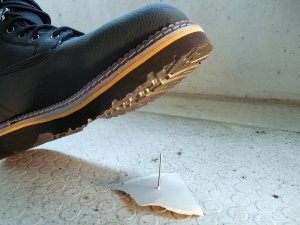Need Immediate help? Call 717-397-1010
After Hours Call / Text 717-471-2168
Need Immediate help? Call 717-397-1010
After Hours Call / Text 717-471-2168
 Construction sites have one of the biggest risks for injury out of workplaces. Between the high heights and heavy machinery, the workers on site put themselves in danger consistently throughout their day. Without proper training, injury is nearly inevitable. Even with the right training and precautions, injuries still happen, making construction sites one of the top workplaces for Workers’ Compensation and negligence claims.
Construction sites have one of the biggest risks for injury out of workplaces. Between the high heights and heavy machinery, the workers on site put themselves in danger consistently throughout their day. Without proper training, injury is nearly inevitable. Even with the right training and precautions, injuries still happen, making construction sites one of the top workplaces for Workers’ Compensation and negligence claims.
When accidents do occur, Pennsylvania law is on the side of the worker and supports their recovery. Construction site accident claims are handled like any work injury in the state.
A work injury is simply any medical condition, illness or injury that comes as a result of employment. The law that governs work injuries in Pennsylvania purposely excludes specific examples of injuries to ensure conditions caused by employment are covered. This helps to include occupational diseases and pre-existing conditions that are made worse through employment.
The first thing an employee should do after becoming injured on the job is to report it to management. However, this is not always possible. Under Workers’ Compensation law, the employee must give notice of injury within 21 days of the injury or, at the very latest, 120 days. It is a good rule of thumb to report all injuries, even if they seem minor at the time. A small head injury on a construction site could be discovered to have caused a concussion, for example, and lead to time away from work to recover.
Under the Workers’ Compensation Act, payment should either be agreed upon by the company or its insurance company after 21 days or deny the claim. Additionally, loss of wages cannot be paid until there is medical proof from a doctor or other medical professional to confirm injuries. The medical proof should also indicate whether the worker can return to their employment or if there are restrictions on the work that can be performed.
Most workers would prefer to go to their own doctor, but under Section 306(f.1)(1)(i) of the Pennsylvania Workman’s Comp Act, workers filing for Worker’s Compensation must be treated by a company doctor for 90 days after the first visit if the employer provides six designated health providers to choose from. It is also important to know after those 90 days, the injured worker can go to their own doctor for treatment. To use a company doctor, the company must also provide written notification of the employee’s rights and duties and must obtain written acknowledgment from the employee that the rights and duties were provided. If the employer does not provide all the necessary information and get the written acknowledgment, the employee can go to any doctor of their choosing.
If you have been injured while working at a construction site in Pennsylvania, contact us today. Our team has the knowledge and skill to help with workman’s comp claims in the state and will put our experience to work for you.
 While many are familiar with the idea of pain and suffering as it results from other injuries and incidents, few are aware that mental injuries themselves can be compensable. Mental injury claims often come from workplace stressors and are on the rise as claims. For employers, this raises a lot of issues and creates a lot of headaches, especially in their HR departments. It is much more difficult to successfully claim one of these cases, and the issue brings up a lot of questions for both employees and employers.
While many are familiar with the idea of pain and suffering as it results from other injuries and incidents, few are aware that mental injuries themselves can be compensable. Mental injury claims often come from workplace stressors and are on the rise as claims. For employers, this raises a lot of issues and creates a lot of headaches, especially in their HR departments. It is much more difficult to successfully claim one of these cases, and the issue brings up a lot of questions for both employees and employers.
Understanding the link between stress in the workplace and the mental and physical disorders that result is problematic. For instance, it is not yet fully proven that workplace stress can directly cause anxiety and depression, and it is even more burdensome to prove that the anxiety and depression did not exist in any way prior to the work stress. Even further, it is not easy to prove ongoing stress at work is the cause of a heart attack versus genetics or at-home stressors.
However, it is an important aspect of work-life that needs to be better understood. The National Institute of Health estimates that the American economy spends close to $150 billion each year on stress-related issues. This number was estimated based on decreased productivity, missing work, and massive increases in medical expenses. It is also not too uncommon, especially in larger corporations, for there to be millions spent each year on stress management programs.
However, these programs largely seem to not work. The claims of stress-related mental illness and cardiovascular injury continue to rise but most employers and employees are no closer to answering which work-related stress injuries are compensable and which are not. Distinguishing the two from one another comes down to understanding the medical concepts associated with stress along with an understanding of how the legal framework of these concepts should be applied, which is out of the scope of experience and knowledge of most employers.
The burden of proof is the biggest aspect of proving such a case. It is important to know there are three different classifications of these types of claims: physical/mental, mental/physical, and purely mental. In a physical/mental injury, a physical stimulus leads to a mental injury. In a mental/physical injury, a mental or emotional experience leads to a physical injury. In a purely mental incident, there is a mental or emotional stimulus that leads to a mental injury. If you have been a victim of any of these three incidents, contact us today. Our team will help you build evidence to ease the burden of proof and bring you closer to the compensation you deserve.
 Some injuries at work are more complicated than others. For instance, if you are asked to come in and pick something up for or from your boss and are injured on the premises, you may wonder if you are eligible to receive Workers’ Compensation benefits. While you were not on the clock, you were at your place of work and your actions were in benefit of the employer. In a lot of claims like this, you will have a good case for compensation. However, the devil is in the details when it comes to such claims.
Some injuries at work are more complicated than others. For instance, if you are asked to come in and pick something up for or from your boss and are injured on the premises, you may wonder if you are eligible to receive Workers’ Compensation benefits. While you were not on the clock, you were at your place of work and your actions were in benefit of the employer. In a lot of claims like this, you will have a good case for compensation. However, the devil is in the details when it comes to such claims.
The first question is whether it was in the scope of your employment or not. For instance, if you stopped in the office because you left your cell phone on your desk, it was not in the interest of your employer nor was it in the scope of your employment. However, running an errand for your boss or coming in to prepare for your next shift is a different story. In those cases, you would not have been on the premises and would not have been injured had it not been for your employment.
In most states, these benefits cover medical costs and lost wages when an employee is injured during the course of their employment. There are some exceptions to this general rule.
The law surrounding Workers’ Compensation is rarely black and white. The law tows the line between protecting the rights of workers while also looking out for the best interest of the company as a whole. Some of the exceptions for injuries that are technically off the clock but are still covered by Workers’ Compensation include:
Working outside of regular business hours and coming by after hours are also usually covered by the exceptions. If you have been injured while off the clock but feel you still deserve compensation, contact us today. Our professionals will help you figure out your legal options.
 Lost wages are common when it comes to injury claims. Whether you have been in a car accident or have been injured at work, any time you cannot earn money while at work can be argued as lost wages. Simply put, lost wages can be quickly summarized as the money you would have earned had you not been injured. However, the time lost must be a result of the injuries sustained and those injuries must be related to the claim you are making.
Lost wages are common when it comes to injury claims. Whether you have been in a car accident or have been injured at work, any time you cannot earn money while at work can be argued as lost wages. Simply put, lost wages can be quickly summarized as the money you would have earned had you not been injured. However, the time lost must be a result of the injuries sustained and those injuries must be related to the claim you are making.
For instance, if you are injured at work but later have to miss a day due to migraines, that missed time does not count as lost wages, even though it was during the time you were recovering from the other injury. However, if you are suffering from migraines because of a head injury you sustained and you had to go to a doctor to be treated, that time would count toward lost wages. Recovery time also counts toward this, but only if it can be proven that it was due to the injury.
As an example, taking an extra day to stay home because you are not feeling up to going back does not count. However, if you have a medical note saying you are not allowed to go back to work, this is covered. When it comes to these claim, the real burden is proving your lost wages.
To prove your lost wages, you must submit evidence, just as you would with a personal injury. The following documents must be in every case:
If you were injured and had to miss work as a result of a workplace injury, contact our team today to get started on your claim.